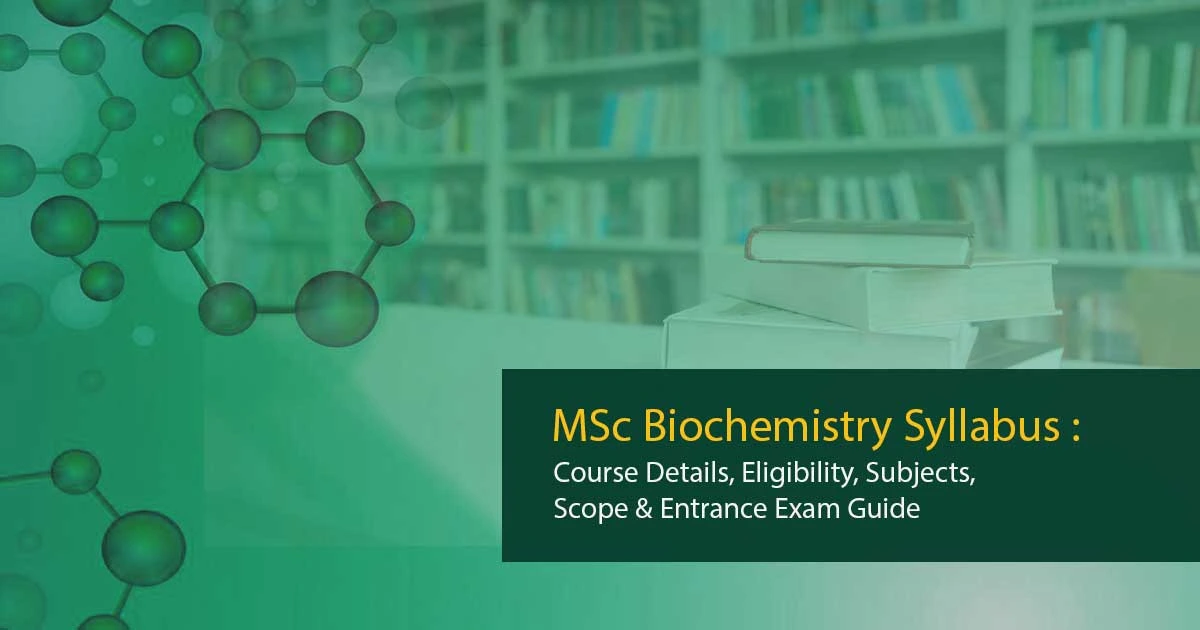Blog Detail


MSc Biochemistry Syllabus: Course Details, Eligibility, Subjects, Scope & Entrance Exam Guide
24-04-2025

Table of Content:
- Course Overview
- MSc Biochemistry Eligibility
- MSc Biochemistry Subjects
- Core Subjects Include:
- Electives (may vary by institution):
- MSc Biochemistry Syllabus Breakdown
- Semester-wise Curriculum
- MSc Biochemistry Entrance Exam Syllabus
- Career Opportunities and Scope
- Potential Career Paths:
- Conclusion
- FAQs
Biochemistry is a blend of biology and chemistry, offering in-depth insights into the molecular mechanisms that drive living organisms. A Master of Science in Biochemistry is an intensive academic programme that fosters research capabilities and technical proficiency in fundamental and applied sciences. It provides a strong foundation for careers in research, healthcare, pharmaceuticals, agriculture and biotechnology industries.
This blog offers a comprehensive walkthrough of the MSc Biochemistry course details, including eligibility, core and elective subjects, career scope, and entrance exam guides, for students seeking to explore their options in the biochemistry domain.
Course Overview
The MSc in Biochemistry is a two-year postgraduate degree that explores the chemical processes and substances present within living organisms. The programme offers an interdisciplinary approach to studying cellular processes, metabolism, genetics and molecular biology.
Students in this programme gain theoretical knowledge and hands-on laboratory experience, preparing them for dynamic roles in academia, research labs, pharmaceutical industries and beyond.
MSc Biochemistry Eligibility
Students aspiring to pursue this programme should have a Bachelor’s degree in Biochemistry, Chemistry, Biology, Biotechnology, Microbiology, or any relevant life sciences discipline. Most institutions require students to have secured a minimum of 50% aggregate marks, although this may vary slightly depending on the institution's specific criteria. A strong academic background in science subjects, combined with a keen interest in molecular and cellular studies, is preferred.
MSc Biochemistry Subjects
The academic structure of the course is divided into core theoretical modules, practical laboratory sessions, electives, seminars and a research project or dissertation. The MSc Biochemistry syllabus aims to provide students with a comprehensive understanding of key biochemical concepts and techniques.
Core Subjects Include:
- Molecular Biology
- Enzymology
- Metabolism and Bioenergetics
- Clinical Biochemistry
- Immunology
- Genetic Engineering
- Bioinformatics
- Biostatistics
Electives (may vary by institution):
- Neurobiochemistry
- Environmental Biochemistry
- Advanced Cell Biology
- Plant Biochemistry
- Biophysics
Each semester includes intensive laboratory training, integral to the Biochemistry syllabus for MSc. The research project in the final semester promotes independent scientific inquiry and strengthens analytical thinking.
MSc Biochemistry Syllabus Breakdown
The MSc Biochemistry syllabus is typically spread across four semesters. It focuses on a progressive learning curve, beginning with the basics of biomolecules and gradually advancing to complex genetic and metabolic pathways.
Semester-wise Curriculum
Semester I
- Bioenergetics and Bioorganic Chemistry
- Microbiology
- Biomolecules
- Clinical and Physiological Biochemistry
- Learning Labs: Biochemical Assays and Techniques in Microbiology
Semester II
- Enzymology
- Metabolism-I
- Biophysical and Analytical Biochemistry
- Bioinformatics and Biostatistics
- Learning Labs: Techniques in Biochemistry and Enzyme Kinetics
Semester III
- Metabolism -I
- Molecular Biology-I
- Immunology
- Biotechnology
- Biochemical Genetics
- Plant Biochemistry
- Developmental Biology and Endocrinology
- Molecular Biology and Immunology
Semester IV
- Molecular Biology-I
- Neurochemistry and Signal Transduction
- Medical Biotechnology
- Phytochemistry and Pharmacognosy
- Pharmaceutical Microbiology
- Microbial Biopolymers
- Learning Labs: Nutritional Biochemistry, Protein Chemistry, Project, Presentation, Defence and Comprehensive oral examination
MSc Biochemistry Entrance Exam Syllabus
Admission for the programme is often based on merit or performance in national or university-level entrance exams. The MSc Biochemistry entrance exam syllabus generally includes:
- Fundamentals of Biochemistry
- Cell Biology and Molecular Biology
- Genetics
- Microbiology
- Analytical Techniques
- General Aptitude and Reasoning
Preparation requires a deep understanding of undergraduate-level science and problem-solving skills. Students are advised to refer to previous years’ question papers and practice mock tests to improve their scores.
Career Opportunities and Scope
The MSc Biochemistry scope is broad and promising. With increasing advancements in molecular medicine, pharmaceuticals, genetic engineering and agricultural biotechnology, there is growing demand for skilled biochemists in various sectors.
Potential Career Paths:
- Research Scientist
- Clinical Biochemist
- Molecular Biologist
- Biomedical Scientist
- Quality Control Analyst
- Environmental Biochemist
- Biotech Product Manager
- Professor or lecturer in Higher Education
Public and private organisations, hospitals, research institutes, diagnostic centres and pharmaceutical companies are common employers. The degree also opens doors to competitive examinations for fellowships and doctoral studies.
Given its research-driven approach, the MSc Biochemistry scope also extends internationally, offering numerous opportunities in the global biotech and healthcare sectors.
Conclusion
Pursuing an MSc in Biochemistry is a rewarding academic journey for students passionate about life sciences and scientific discovery. With a well-rounded curriculum, practical exposure and vast career opportunities, this postgraduate programme offers a solid foundation for those aspiring to make meaningful contributions in science and healthcare. Whether you aim to innovate in the lab, teach in academia or work at the forefront of biomedical industries, this programme paves the way for diverse professional achievements.
FAQs
Q1. How difficult is biochemistry?
A1. Biochemistry can be challenging as it combines complex topics from Biology and Chemistry. However, it becomes manageable and intellectually stimulating with consistent study and a good grasp of fundamental concepts.
Q2. Can you get a PhD in biochemistry?
A2. Yes. After completing an MSc in Biochemistry, one can pursue a PhD in Biochemistry or related specialisations. This allows for deeper research and academic opportunities.
Q3. What is the future of biochemistry?
A3. Biochemistry is central to modern scientific developments, especially in medicine, genetics, environmental science and biotechnology. There is a future in personalised medicine, drug development and molecular diagnostics.
Q4. Does biochemistry require NEET?
A4. No. NEET is not required for MSc Biochemistry admissions. However, entrance exams conducted by individual universities or other competitive exams may be applicable.
Q5. Is the scope of MSc Biochemistry?
A5. The scope of MSc Biochemistry is vast, encompassing research, healthcare, pharma, biotechnology, academia and government roles. With growing scientific advancements, biochemistry professionals are in demand globally.